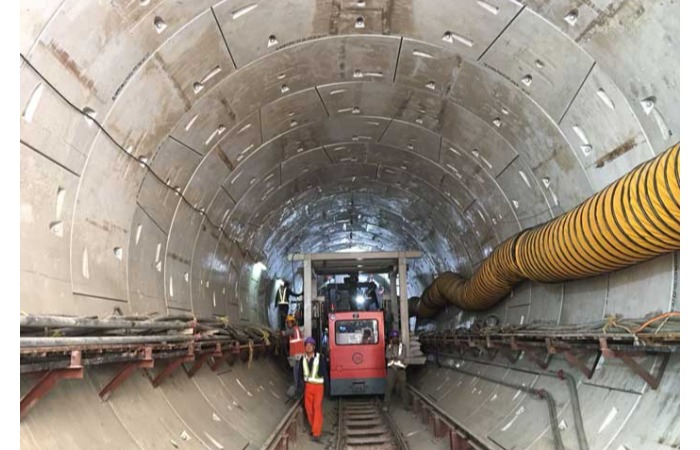
Amberg follows a comprehensive ESG strategy
Barad Sharma, CEO, Amberg Engineering, speaks on the key challenges and opportunities the Indian market presents for advanced tunnelling solutions.
With India rapidly expanding its tunnel network for metros, highways, railways, and hydropower, is Amberg looking to deepen its presence here, and what recent developments support that?
Amberg Engineering has established a strong and growing presence in India since its registration in 2012. We are proud to be recognised as one of the leading underground design consultants in the country, having contributed to several landmark infrastructure projects across the nation. In addition to our registered office in Gurugram (Haryana), we have recently opened a branch office in Mumbai to strengthen our reach in the western region.
To further deepen our engagement in India, we have launched the Amberg Experience Centre in Gurugram. This state-of-the-art facility showcases the full portfolio and expertise of all Amberg Group companies, including Amberg Tunnel Seismic Prediction (TSP), Amberg Rail, and Amberg Tunnel. The Centre serves as a dynamic platform for interactive learning, knowledge sharing, and collaboration between Amberg and key stakeholders in the Indian infrastructure sector.
Further, Amberg Infocon (AGI), the Indian subsidiary of the Amberg Group, has been active in the India as a specialised engineering consulting firm in the BIM, architecture, engineering and facility management of infrastructure projects. Its extensive experience spans infrastructure, residential, airport, hospital and mixed-use developments. Amberg Engineering together with Amberg Infocon can provide end to end services and solutions for the infrastructure projects.
What are the key challenges and opportunities the Indian market presents for advanced tunnelling solutions?
The Indian market presents both significant challenges and promising opportunities for Amberg Engineering in the field of advanced tunnelling solutions. Key challenges include complex and variable geological conditions, a highly price-sensitive environment, dense urban environments, aggressive timelines and limited awareness of advanced technologies like TSP.
Despite these hurdles, the market offers substantial opportunities due to its scale, government investments in metro, highways, rail, high-speed rail and hydropower tunnels, as well as a growing demand for safer, smarter and digitally integrated tunnelling solutions. The increasing openness of private players in PPP and EPC models further enhances this opportunity.
Amberg Engineering has contributed to several landmark national projects across the rail, road, and metro sectors—positioning us strongly to deliver advanced and integrated tunnelling solutions tailored to India’s evolving infrastructure needs.
Leveraging the collective expertise of our Amberg Group companies including Amberg Infocon, we offer a unique advantage through our ability to provide end-to-end solutions, hands-on technology demonstrations and client education—all under one roof.
How do you see the tunnelling and underground infrastructure market evolving globally, and where does Amberg see the strongest growth potential in the coming years?
Globally, the tunnelling sector is moving towards digital integration, automation, real-time monitoring and lifecycle-based asset management. The most significant growth is anticipated in Asia and the Middle East because of rapid infrastructure development, while Europe is witnessing increased demand due to the rising need for tunnel rehabilitation and digital modernisation.
Amberg’s focus on predictive insights, surveying automation and tunnel lifecycle monitoring aligns with these trends and offers flexible and adaptable solutions across both emerging and mature markets.
How is Amberg addressing workforce development and knowledge transfer, especially when entering emerging markets or large-scale projects?
Amberg supports deeply in the development of its workforce through structured trainings, technical workshops and mentoring to ensure knowledge of the latest methods and innovations in the underground industry.
On live projects, local engineers are embedded with international experts, enabling real-time knowledge transfer. We also participate in academic collaborations and industry forums to build capacity in tunnelling methods, digital systems and safety practices.
What is Amberg’s ESG strategy when it comes to tunnelling projects?
Amberg follows a comprehensive ESG strategy across all project phases. From an environmental perspective, we are adhering to ISO-14001 and ISO-45001, utilise seismic prediction and real-time monitoring systems to reduce risk and environmental impact. Our designs focus on energy-efficient ventilation and operational safety. Socially, we invest in workforce training and community engagement and promote safe working environments. Governance is ensured through ISO-9001 certified quality management systems, regulatory compliance and transparent execution protocols.
How do you evaluate and select tunnelling equipment to optimise performance and cost effectiveness across different ground and project types?
Amberg adopts a data-driven approach to equipment selection involving comprehensive geological and geotechnical analysis. We leverage BIM supported simulations, risk modelling and cost-benefit assessments to match tunnelling methods with the specific ground conditions. Equipment decisions are validated against lifecycle performance, cost, risk, and project duration to ensure maximum efficiency and value.
How are you integrating cutting-edge innovations into tunnelling equipment standards?
Amberg is actively integrating cutting-edge innovations into tunnelling equipment standards by combining advanced technologies, continuous research and digital development with deep domain expertise. These innovations enhance safety, efficiency and precision across the entire tunnel lifecycle.
Key areas of innovation include the use of Tunnel Seismic Prediction (TSP) to identify geological risks ahead of excavation, automatic real-time tunnel monitoring and digital twin technology for continuous tunnel monitoring and asset management.
Through Amberg Technologies and Amberg Infra 7D verticals, we are also embedding AI-driven analytics, BIM integration and IoT-enabled sensors into equipment and workflows to support infrastructure monitoring for predictive maintenance and data-driven decision-making. These innovations are not only setting new benchmarks in tunnelling standards but also aligning with global trends in sustainable.


 +91-22-24193000
+91-22-24193000 Subscriber@ASAPPinfoGlobal.com
Subscriber@ASAPPinfoGlobal.com